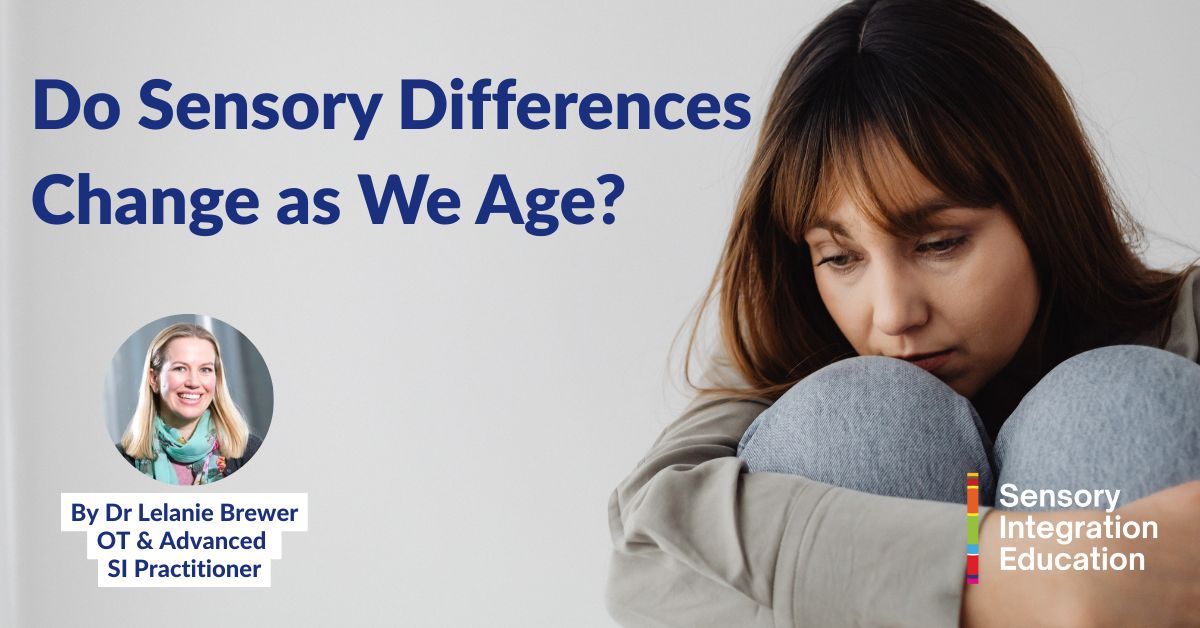-

(G123) Introduction to Building Adult Sensory Programmes: Foundations, Assessment and Intervention – 5 Nov 2025
CourseA live webinar with practical tools and strategies for clinicians working with adults with sensory processing challenges
-

(G137) The Sensory Side of Parenting – 18 Nov 2025
Course4.5 average rating (2 reviews)Live webinar: Considers why parents’ sensory needs matter – and how their sensory profile can either support or unintentionally clash with their child’s, especially in the context of co-regulation.
-

(G141) Sensory Integration and Burnout in ADHD – 18 Feb 2026
CourseIn this live webinar, discover how sensory processing differences in ADHD contribute to burnout, and learn practical strategies from a sensory integration perspective to recognise, reset, and break the cycle for lasting wellbeing.
£69
Do Sensory Differences Change as We Age?
By Dr Lelanie Brewer, 23 October 2025

This is a question that often arises from parents, educators, and adults: Do people grow out of sensory processing differences? Like many things related to human development, the answer is nuanced.
Sensory processing differences are part of how we all experience and interpret the world around us. For some individuals, sensory information can feel too intense, not noticeable enough, or confusing to interpret. When these differences impact on daily life we often refer to these as sensory processing challenges. It’s common for sensory processing differences that affect participation to become noticeable in early childhood—often during nursery or primary school years when children are expected to sit still, follow routines, or learn new skills.
Some children’s sensory challenges do appear to decrease age. However, this doesn’t necessarily mean they’ve grown out of them. What’s more likely is that:
- They have received therapy input to help with difficulties they have experienced.
- The nervous system matures, leading to better sensory organisation.
- Children develop coping strategies or learn to avoid or manage sensory triggers.
- Environments and expectations have changed, reducing stress and exposure to sensory overload.
Therefore, it is very likely that they will encounter sensory experiences that are uncomfortable as they get older.
How Do People Adapt to Sensory Differences as They Get Older?
One of the biggest adaptations is that people seek out environments or tasks that meet their sensory preferences and needs. For example, a child who struggled with loud playground noise may still find crowded environments challenging as an adult, but they may choose quieter restaurants or prefer to socialise at home.
So, while the expression of sensory differences may change, some sensory differences may be consistent throughout life. We also know that sensory preferences and sensitivities continue to influence how many people work, learn, and interact in adulthood.
What Factors Influence Sensory Differences in Adults?
Firstly, many adults might describe sensory challenges differently—they may say they’re “easily overstimulated,” “hate background noise,” or “need to move to focus.” Many people discover in adulthood that lifelong preferences (like avoiding bright lights or certain fabrics) are connected to sensory processing rather than personality quirks.
For neurodivergent individuals—such as those who are autistic or have ADHD—sensory differences are often a lifelong aspect of their neurotype. Recognising and accommodating these needs is therefore essential for wellbeing.
Hormonal Changes, Age and Sensory Differences
Many people are familiar with how hormones can affect mood, sleep, and energy. But hormonal changes and aging can also influence how humans process sensory information. For some people the sights, sounds, smells, and physical sensations of daily life change as they get older or they feel on edge in environments that they once found manageable. That is the result of their sensory system reacting to hormonal shifts or the natural ageing process.
Sensory Changes in Later Life
Finally, as we age, the sensory systems themselves change. Vision and hearing can decline, while touch and proprioceptive feedback become less reliable. For some, reduced input leads to under-responsivity (missing sensory cues), while for others, the brain compensates with heightened reactivity to maintain balance. This can contribute to fatigue, irritability, or difficulty navigating noisy or crowded environments.
How to Support Sensory Regulation Throughout Life
While we can’t control hormonal cycles or aging, we can support the body and nervous system to stay balanced and comfortable. By understanding the connection between hormones, age, and sensory processing, we can reduce frustration, enhance self-care, and promote inclusion for individuals at every stage of life. Tips to include sensory regulation include:
- Tune in to sensory preferences: Notice when sensory sensitivity increases — across your cycle, with fatigue, or at certain times of life.
- Build sensory regulation routines: Include calming sensory inputs such as gentle movement, deep pressure, breathing, or time in nature.
- Create supportive environments: Adjust lighting, noise levels, and temperature to match your comfort and sensory preferences.
- Seek support: Sensory screening and consultation from a Sensory Integration trained therapist can help identify triggers and strategies for regulation.
Dr Lelanie Brewer
Highly Specialist Occupational Therapist, Advanced Sensory Integration Practitioner, PhD, MScOT, BSc, FHEA
Sensory Integration Education is a leading UK provider of postgraduate and CPD training in sensory integration. Our postgraduate courses are accredited by Sheffield Hallam University.
Check Out Our Upcoming Adult Focused Training Events
You can purchase individual events or get access to a whole year of CPD events with a Lifelong Learning Programme subscription.

